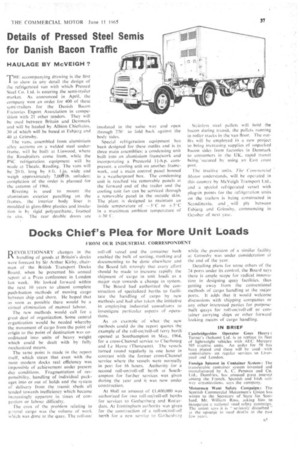Docks Chief's Plea for More Unit Loads
Page 39

If you've noticed an error in this article please click here to report it so we can fix it.
FROM OUR INDUSTRIAL CORRESPONDENT
D EVOLUTIONARY changes in the
handling of goods at Britain's docks were forecast by Sir Arthur Kirby, chairman of the British Transport Docks Board, when he presented his annual report at a Press conference in London last week. He looked forward within the next 10 years to almost complete push-button methods of moving cargo between ship and shore. He hoped that as soon as possible there would be a virtual elimination of manual labour.
The new methods would call for a great deal of organization. Some central organization would be, needed whereby the movement of cargo from the point Of origin to the point of destination was coordinated into units of heavy weight which could be dealt with by fully mechanized means.
The same _point is made in the report itself, which states that even with the most modern docks real efficiency was impossible of achievement under present day conditions. Fragmentation of responsibility, handling of individual packages into or out of holds and the system of .delivery from the transit sheds all tended towards inefficiency which became in:teasingly apparent. in times of congestion or labour difficulty.
The crux of the problem relating to g....7rtcral cargo was the volume of work which was done at the quay. The roll-on; roll-off vessel and the container both enabled the hulk of sorting, marking and documenting to be done elsewhere and the Board felt strongly that every effort should he made to increase rapidly the shipment of cargo in unit load as a major step towards a change in system.
The Board had authorized the construction of specialized berths to facilitate the handling of cargo by new methods and had also taken the initiative in employing industrial consultants to investigate particular aspects of operations.
As an example of what the new methods could do the report quotes the example of the roll-on/roll-off ferry berthr opened at Southampton in May, 1964, for a cross-Channel service to Cherbourg and Le Havre (Thoresens). The vessels turned round regularly in one hour in contrast with the former cross-Channel service where the vessels were normally in port for 16 hours. Authority, for a second roll-on/roll-off berth at Southampton for further services was given during the year and it was now under construction.
At Hull an amount of €1,400,000 was authorized for two roll-on/roll-off berths for services to Gothenhurg and Rotterdam. At Immingham authority was given for the construction of a roll-on/roll-off berth for a new service to Gothenburg while the provision of a similar facility at Grimsby was under consideration at the end of the year.
Detailing plans for some others of the 24 ports under its control, the Board says there is ample scope for radical innovation in designing quay facilities, thus getting away from the conventional methods of cargo handling at the major ports. It adds that it would welcome discussions with shipping companies or ally other interested parties for purposebuilt quays for roll-on/roll-off or container carrying ships or other forward looking means of cargo handling.
IN BRIEF Cambridgeshire Operator Goes Heavy: Turner's (Soham) Ltd. is to replace its fleet of lightweight vehicles with AEC Mercury 505 tractive units. An order for 50 has been placed and these will he used -with semi-trailers-on regular services to Liverpool and London.
Foreign Interest in Container Svstem: The transferable container system invented and manufactured by A. C. Penman and Co. Ltd., Dumfries, has aroused great interest among the French, Spanish and Irish railway organizations, says the company.
Motormen Want Safety Campaign: The Scottish Commercial Motormen's Union has witten to the Secretary of State for Scotland, Mr. William Ross. asking him to inaugurate a national road safety campaign. The union says it is seriously disturbed at the upsurge in road deaths in the past few years.




























































































































